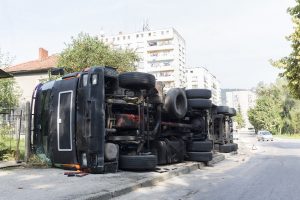Truck accidents in New Jersey and across the U.S. are grim realities. The features of an 18-wheeler and its massive size typically lead to devastation when these semis are involved in a collision with a passenger vehicle. But, when these tragedies strike and the driver of the passenger vehicle is not at fault, who is liable? The answer is almost never readily obvious in these circumstances.
Respondeat Superior Doctrine – Liable Employers
The first question that must be answered in determining liability – or legal responsibility – in these types of accidents is whether the driver is an employee who was on duty when the accident occurred. Generally speaking, under common law, the respondeat superior doctrine holds employers responsible for the actions of their employees while working. If the driver is an employee who caused harm during the scope of employment, the employer will very likely bear liability for the injuries and damages caused by the accident. In these cases, though both the driver and his employer will be named in the lawsuit, the victims cannot recover from both parties, only from the employer.
Other Parties
Trucking companies and their drivers are highly regulated on the federal level via the Transportation Federal Motor Carrier Safety Administration and the U.S. Dept. of Transportation. New Jersey weighs in as well with state laws for commercial carriers. These various laws and regulations address a wide range of activities and requirements:
- Hours of service
- Record keeping via duty logs
- Weight/size standards
- Testing for drugs and alcohol
- Insurance requirements
- Licensing
- Cargo
- Permissible truck routes/roadways
- Speed limits
In addition to these standards, reasonable expectations must be met by a wide range of service individuals who are typically instrumental in the trucking industry. When a large truck is at fault for an automobile accident, the cause may be the result of several factors, and this means there can be multiple responsible parties:
- The driver
- The owner of the truck cab
- The owner of the truck trailer
- Cargo Loader
- Freight Owner
- Leasing company
- Third-party maintenance companies/garages
- Truck manufacturers
- Parts manufacturers
- Construction companies
- Parts Installers
- Equipment sellers/distributors
A truck accident claim is usually quite complex, from the determination of liable parties and the cause of the accident to the very real damages associated with the injuries sustained by the victims and the lifelong effects of this devastating event. These are only a few of the crucial issues to be faced in these lawsuits. For these reasons, it’s critical to retain a knowledgeable and experienced NJ truck accident attorney as soon as possible when pursuing a personal injury claim or a wrongful death suit for a devastating New Jersey truck accident.
